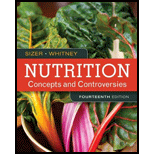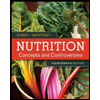
Nutrition: Concepts and Controversies - Standalone book (MindTap Course List)
14th Edition
ISBN: 9781305627994
Author: Frances Sizer, Ellie Whitney
Publisher: Brooks Cole
expand_more
expand_more
format_list_bulleted
Concept explainers
Question
Chapter 10, Problem 2RQ
Summary Introduction
Introduction:
Sports drinks are used by athletes to provide or recover the energy, electrolytes, body fluids, and salts that are needed or lost during heavy exercise. They can be taken before, after, or during workout as a better substitute for water.
Expert Solution & Answer
Trending nowThis is a popular solution!

Students have asked these similar questions
If you want to do one thing to control stress, keep good bone density into late adulthood, keep your
weight in check, keep your cardiovasculature running well, sleep well most nights, and reduce your
risk of a host of chronic diseases, you should:
Eat a high protein diet
Exercise regularly
Make sure to get a lot of rest
Eat lots of fruit
Take a multivitamin/mineral supplement
Caffeine is a stimulant found in coffee, tea, soft drinks and other drinks and foods. After consumption, caffeine is absorbed into the blood stream and carried throughout the body and to the brain. In moderate amounts (~300 mg per day) it causes increased attentiveness, it reduces feelings of fatigue, and it enables most people to think clearly and concentrate for longer periods. Caffeine also increases heart rate and rate of respiration. In large quantities (>600 mg per day) its effects are magnified. People sometimes feel irritable, distracted and tense.
People often use caffeine to increase mental alertness. Some people are more sensitive than others to the effects of caffeine. People who consume caffeine regularly may build up a tolerance to its effects. Further, since caffeine is mildly addictive, people who regularly consume caffeine may experience some withdrawal effects if they stop consumption.
The Study
In this study, three people each consumed varying levels of…
Look up this information about the mineral fluorine:
1.Sources of this mineral2. Functions of the mineral in the animal body3. Requirements of dogs and cats, if they are different4. Effects on the body of a mineral deficiency5.Toxic effects of the mineral (excess)6.Interaction with other nutrients (proteins, carbohydrates, fats, vitamins or other minerals), if any.7. Other important information
Chapter 10 Solutions
Nutrition: Concepts and Controversies - Standalone book (MindTap Course List)
Ch. 10 - Prob. 1RQCh. 10 - Prob. 2RQCh. 10 - Prob. 3RQCh. 10 - Most of the time, the buyer is wasting his or her...Ch. 10 - Divide into two groups. One group will argue in...Ch. 10 - Prob. 1SCCh. 10 - The length of time a person must spend exercising...Ch. 10 - Prob. 3SCCh. 10 - To overload a muscle is never productive. T FCh. 10 - Prob. 5SC
Ch. 10 - Prob. 6SCCh. 10 - Prob. 7SCCh. 10 - Prob. 8SCCh. 10 - Prob. 9SCCh. 10 - All of the following statements concerning beer...Ch. 10 - Prob. 11SCCh. 10 - Prob. 12SCCh. 10 - Prob. 13SCCh. 10 - Prob. 14SCCh. 10 - Prob. 15SCCh. 10 - Prob. 16SCCh. 10 - Prob. 17SCCh. 10 - Prob. 18SCCh. 10 - Prob. 19SC
Knowledge Booster
Learn more about
Need a deep-dive on the concept behind this application? Look no further. Learn more about this topic, health-nutrition and related others by exploring similar questions and additional content below.Similar questions
- Regarding fluid intake in school-age children, which of the following statements is most correct? a. Soft drinks are good choices for hydration during exercise because the high carbohydrate content provides quick energy. b. Childrens caffeine consumption decreases as they get older. c. Diluted fruit juice is a good choice for hydration during exercise, as children are more likely to drink it than water. d. Adults who are supervising children during exercise can rely on the children to let them know when they are thirsty.arrow_forwardWeight loss increases the plasma concentration of organochlorides in the blood. Organochlorides increase thyroid hormone levels and mitochondrial function. Group of answer choices True Falsearrow_forwardpick one option A nurse at a health fair is assessing the weight of four clients. Which of the following clients should be classified as overweight? A female client with a body mass index of 24 A male client with a waist circumference of 96.52 cm(38in) A male client with a body mass index of 29 A female client with a waist circumference of 101.6 cm (40 in)arrow_forward
- O prevents the mother from excessive weight gain Inhalents often are the first drug thata young person uses because *: O they produce a quick 'high' O the 'high' usually only lasts a few minutes O they are easily accessible O they do not produce physical dependence might a person's weight influence the effect of a drug?* Lỉnfluencearrow_forwardA study is being done to consider the side effects of a medication on people who weight over 100kg. If a patient weighs 205lb, will the patient qualify for the study. Answer yes or no.arrow_forwardAlong with PTH, what vitamin is essential in helping to maintain blood calcium levels? A. Vitamin E B. Vitamin A C. Vitamin K D. Vitamin Darrow_forward
- Which food can cause a hypotensive crisis in clients taking monoamine oxidase inhibitors (MAOls)? Select all that apply. One, some, or all responses may be correct. Figs Apples Yogurt Pepperoni Cheddar cheesearrow_forwardWhich of the following individuals will benefit the MOST from consuming a sports beverage? A. Elderly person who is taking a diuretic B. Athlete who excercises intensely for more than one hour C. Adult who participates in regular physical activity 30 minutes a day. D. Child who will not drink milk.arrow_forwardWhich of the following statements is not true? a. Essential nutrients can be synthesized by the body. b. Vitamins are required in small quantities for bodily function. c. Some amino acids can be synthesized by the body, while others need to be obtained from diet. d. Vitamins come in two categories: fat-soluble and water-soluble.arrow_forward
- Last evening Zac went out to the local pub with a few friends from university. There was a new band playing at the pub and Zac was especially excited to be going. To save money Zac and his friends met up at a friend’s house for ‘pre-drinks’. During this time Zac drank around four full strength beers. Zac Smyth is 18 year old university student who lives on-campus as his parents reside in another state. Zac is studying engineering and enjoys university life. Zac has a part-time job working at the local supermarket for 15 hours each week. Zac has no immediate family in the state but he has a friend of his parents that he sees from time to time. Zac usually goes home to his family during his breaks but due to his work commitments, Zac has not seen his mum, dad and younger brother for the past 4 months. When Zac and his friends arrived at the pub, they headed straight for the bar to get another beer. Zac and his friends were having a great night, the music was good and the pub was busy.…arrow_forwardLast evening Zac went out to the local pub with a few friends from university. There was a new band playing at the pub and Zac was especially excited to be going. To save money Zac and his friends met up at a friend’s house for ‘pre-drinks’. During this time Zac drank around four full strength beers. Zac Smyth is 18 year old university student who lives on-campus as his parents reside in another state. Zac is studying engineering and enjoys university life. Zac has a part-time job working at the local supermarket for 15 hours each week. Zac has no immediate family in the state but he has a friend of his parents that he sees from time to time. Zac usually goes home to his family during his breaks but due to his work commitments, Zac has not seen his mum, dad and younger brother for the past 4 months. When Zac and his friends arrived at the pub, they headed straight for the bar to get another beer. Zac and his friends were having a great night, the music was good and the pub was busy.…arrow_forwardHow might a person's weight influence the effect of a drug? * O Heavy people are more likely to take drugs O The less a person weighs, the greater the effect is for a given dose O The more a person weighs, the greater the effect is for a given dose OWeight rarely has any influence on drug effects The use of chewing tobacco is an example of drug use byarrow_forward
arrow_back_ios
SEE MORE QUESTIONS
arrow_forward_ios
Recommended textbooks for you
 Nutrition: Concepts and Controversies - Standalo...Health & NutritionISBN:9781305627994Author:Frances Sizer, Ellie WhitneyPublisher:Brooks Cole
Nutrition: Concepts and Controversies - Standalo...Health & NutritionISBN:9781305627994Author:Frances Sizer, Ellie WhitneyPublisher:Brooks Cole Nutrition Through The Life CycleHealth & NutritionISBN:9781337919333Author:Brown, Judith E.Publisher:Cengage Learning,
Nutrition Through The Life CycleHealth & NutritionISBN:9781337919333Author:Brown, Judith E.Publisher:Cengage Learning,- Lifetime Physical Fitness & WellnessHealth & NutritionISBN:9781337677509Author:HOEGERPublisher:Cengage


Nutrition: Concepts and Controversies - Standalo...
Health & Nutrition
ISBN:9781305627994
Author:Frances Sizer, Ellie Whitney
Publisher:Brooks Cole

Nutrition Through The Life Cycle
Health & Nutrition
ISBN:9781337919333
Author:Brown, Judith E.
Publisher:Cengage Learning,


Lifetime Physical Fitness & Wellness
Health & Nutrition
ISBN:9781337677509
Author:HOEGER
Publisher:Cengage
